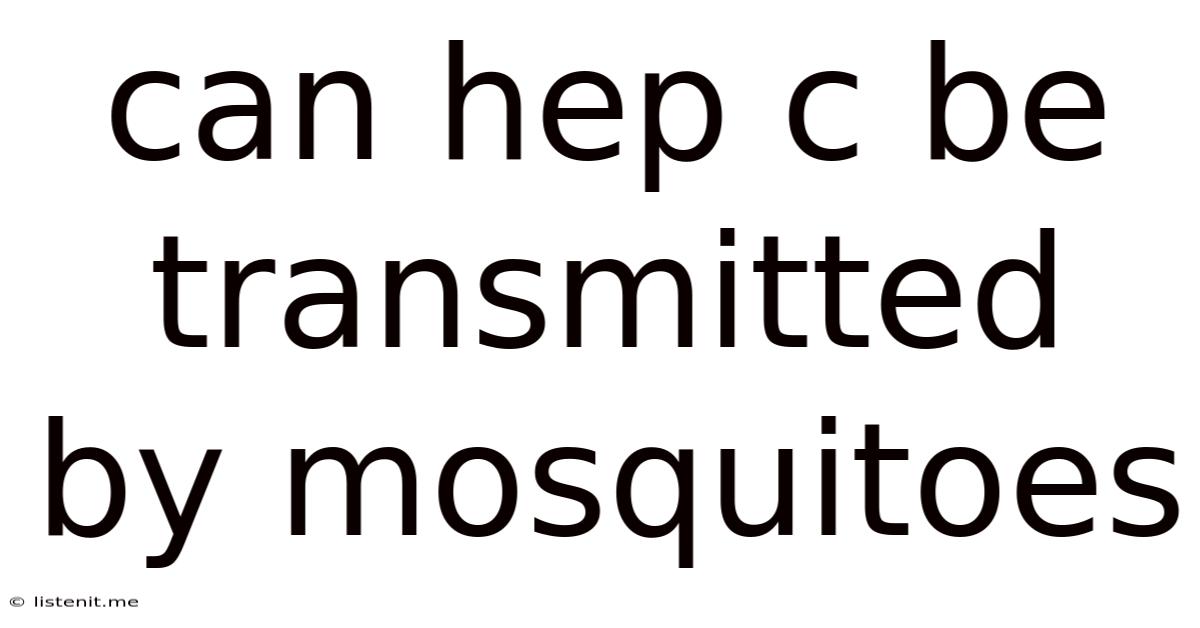Can Hep C Be Transmitted By Mosquitoes
listenit
Jun 09, 2025 · 4 min read

Table of Contents
Can Hepatitis C be Transmitted by Mosquitoes?
Hepatitis C (HCV) is a serious liver infection caused by the hepatitis C virus. While it's a significant public health concern, understanding its transmission routes is crucial for prevention and control. A common question that arises is whether mosquitoes can transmit HCV. This comprehensive article delves deep into the science behind HCV transmission, addressing the question directly and exploring related misconceptions.
Understanding Hepatitis C Transmission
Hepatitis C is primarily transmitted through contact with infected blood. This can occur in several ways:
Direct Blood-to-Blood Contact:
- Sharing needles or syringes: This is the most common route of HCV transmission, particularly among individuals who inject drugs. Sharing even seemingly clean needles can expose an individual to the virus.
- Unsanitary tattooing or piercing practices: Using unsterilized needles or equipment during tattoos or piercings can easily transmit HCV.
- Accidental needle sticks: Healthcare workers are at risk of accidental needle sticks involving HCV-infected blood.
- Mother-to-child transmission (vertical transmission): HCV can be passed from an infected mother to her child during pregnancy, childbirth, or breastfeeding. However, this is less common than other transmission routes.
- Sexual transmission: While less common than other routes, HCV can be transmitted sexually, particularly with multiple partners or those with other sexually transmitted infections (STIs). The risk is increased with activities involving bleeding.
Indirect Blood-to-Blood Contact:
- Exposure to contaminated blood or blood products: Though rare in developed countries due to stringent screening procedures, receiving contaminated blood transfusions or blood products can transmit HCV.
Crucially, Hepatitis C is not transmitted through casual contact. This means you cannot get HCV from sharing food, utensils, toilets, or through sneezing or coughing. The virus requires direct contact with infected blood to spread.
Mosquitoes and Virus Transmission
Mosquitoes are known vectors for various diseases, most famously malaria, dengue fever, Zika virus, and West Nile virus. These viruses are transmitted through the mosquito's saliva when it bites a person. However, the life cycle and transmission mechanisms of these viruses differ significantly from HCV.
Why Mosquitoes Cannot Transmit Hepatitis C
Several key factors prevent mosquitoes from transmitting HCV:
- Virus survival in the mosquito: HCV is a fragile virus and doesn't survive well outside the human body. The virus does not replicate within the mosquito's digestive system, unlike many viruses transmitted by mosquitoes. The harsh environment within the mosquito's gut, combined with the short lifespan of the virus outside a host, makes transmission impossible.
- Transmission mechanism: HCV requires direct blood-to-blood contact for transmission. Mosquitoes take blood meals by piercing the skin and drawing blood, not directly injecting their saliva into the bloodstream. HCV isn't present in the mosquito's saliva in a way that would allow transmission.
- Viral load required: A significant viral load is necessary for successful HCV transmission. The amount of HCV a mosquito might ingest during a blood meal is insufficient to cause infection in another individual.
Debunking Myths and Misconceptions
The idea that mosquitoes can transmit HCV is a persistent misconception, likely fueled by a general fear of mosquitoes and a lack of understanding about HCV transmission. It's important to debunk this myth effectively:
- Mosquitoes are not involved in HCV transmission: There's no scientific evidence supporting this claim. Numerous studies on HCV transmission have consistently shown blood-borne transmission as the primary route.
- Focus on proven prevention methods: Instead of worrying about mosquito bites, individuals should concentrate on proven HCV prevention strategies, such as safe injection practices, safe sex practices, and avoiding contact with infected blood.
- Reliable information sources: It's vital to seek reliable information from reputable sources like the Centers for Disease Control and Prevention (CDC), the World Health Organization (WHO), and other trusted medical organizations. Avoid misinformation spread through social media or unreliable websites.
Preventing Hepatitis C Transmission
Effective prevention strategies are crucial in limiting the spread of HCV:
- Safe injection practices: Never share needles or syringes. Use sterile equipment and dispose of used needles safely.
- Safe sex practices: Practice safe sex, including using condoms, and limit the number of sexual partners.
- Screening for HCV: Individuals at high risk for HCV infection should get tested regularly. Early detection allows for prompt treatment and prevention of further transmission.
- Blood safety: Ensuring safe blood transfusions and blood product screening is vital in preventing HCV transmission through this route.
- Healthcare worker safety: Healthcare workers should always adhere to strict infection control protocols to prevent accidental needle sticks and other exposure incidents.
Conclusion
In conclusion, Hepatitis C cannot be transmitted by mosquitoes. This is a scientifically established fact based on the virus's characteristics and transmission mechanisms. The primary route of HCV transmission is through direct or indirect contact with infected blood. Focusing on proven prevention strategies is far more effective than worrying about mosquito-borne transmission. Understanding the true transmission routes empowers individuals to take necessary precautions and protect themselves from this potentially serious infection. Seeking information from reliable sources is key to dispelling myths and misconceptions and making informed decisions about HCV prevention. Remember, responsible behavior and awareness are crucial in controlling the spread of Hepatitis C and protecting public health.
Latest Posts
Latest Posts
-
At Hazmat Incidents Response Models Are Used To
Jun 09, 2025
-
Why Does My Bp Go Up During My Period
Jun 09, 2025
-
What Is The Main Characteristic Of Planing Vessels
Jun 09, 2025
-
Can I Take L Tryptophan With Melatonin
Jun 09, 2025
-
Nutrient Absorption Is Mediated By The
Jun 09, 2025
Related Post
Thank you for visiting our website which covers about Can Hep C Be Transmitted By Mosquitoes . We hope the information provided has been useful to you. Feel free to contact us if you have any questions or need further assistance. See you next time and don't miss to bookmark.